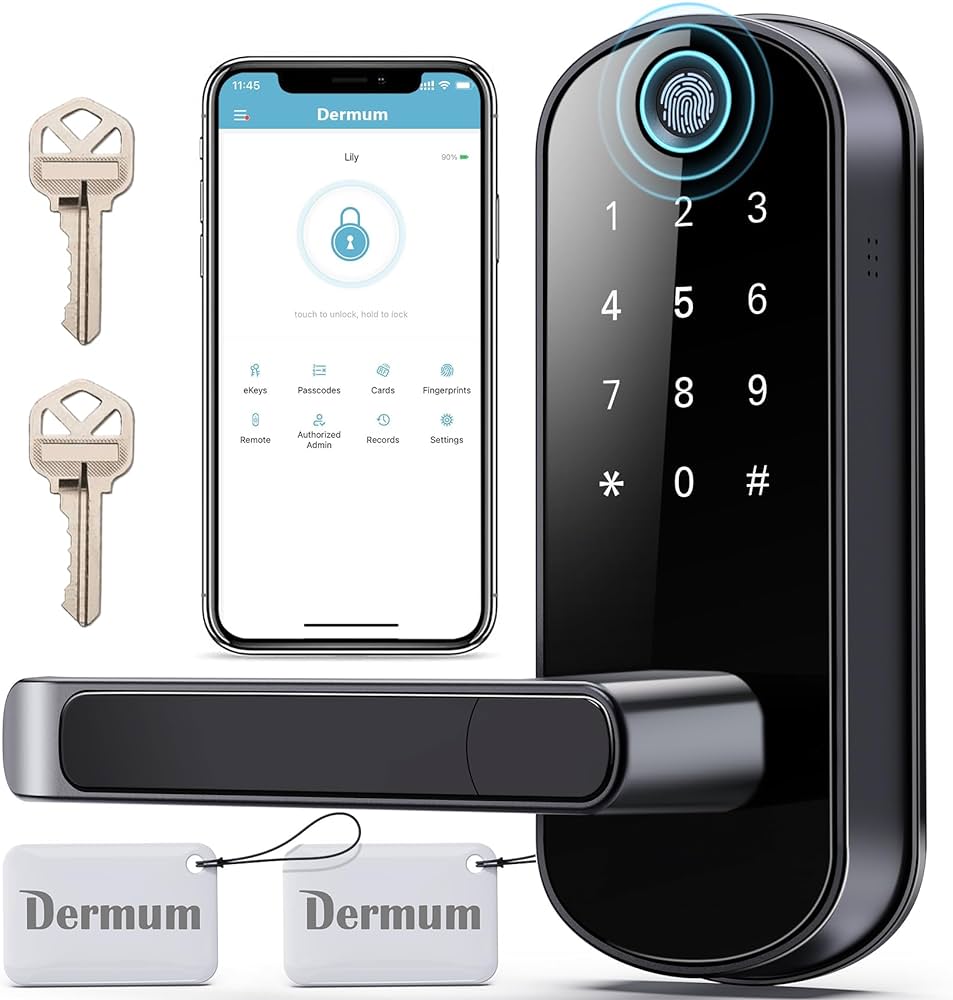Imagine your front door as the gateway to your castle, safeguarding your kingdom. Now, picture this: one lock relies solely on traditional keys, while the other is equipped with advanced technology. The distinction between a smart lock and a normal lock goes beyond the surface. As you consider which one suits your needs best, you may find yourself intrigued by the layers of differences that lie beneath the surface.
Key Features of Smart Locks
- When considering the key features of smart locks, prioritizing security and convenience is essential. Smart locks offer innovative functionalities that enhance your home’s security. One prominent feature is mobile control, allowing you to manage your lock remotely via a smartphone app. This feature enables you to lock or unlock your door from anywhere, providing flexibility and peace of mind.
- Keyless entry is another significant feature of smart locks. With keyless entry, you can enter your home without the need for traditional keys. Instead, smart locks utilize methods such as keypad entry, fingerprint scanning, or Bluetooth connectivity to grant access. This eliminates the risk of losing keys and enhances security by offering personalized access codes or biometric recognition.

Convenience and Accessibility
- Enhancing user experience, smart locks prioritize convenience and accessibility by offering seamless entry options beyond traditional keys. With remote access capabilities, smart locks allow you to control your lock from anywhere, enabling you to grant access to visitors or service providers even when you’re not physically present. This feature enhances convenience by eliminating the need for physical keys or being present to let someone in.
- Moreover, smartphone integration plays a crucial role in enhancing accessibility with smart locks. By connecting your smart lock to your smartphone, you can unlock or lock your door with a simple tap on your device. This integration not only adds a layer of convenience but also ensures that you can monitor and manage your lock status remotely.
- In essence, the convenience and accessibility offered by smart locks through features like remote access and smartphone integration redefine the way we interact with our doors, making everyday tasks more convenient and secure.
Security Levels Comparison
- Comparing the security levels between smart locks and normal locks reveals distinct differences in their protective features and mechanisms. Smart locks offer advanced security features that leverage technology advancements to enhance protection. These locks often include encryption protocols, biometric recognition, and remote monitoring capabilities, providing a higher level of security compared to traditional locks.
- In contrast, normal locks rely on mechanical mechanisms such as pins, tumblers, and keys. While effective, these mechanisms are susceptible to picking, bumping, and other traditional lock-picking techniques. Smart locks, on the other hand, employ complex algorithms and authentication methods to prevent unauthorized access.
- Additionally, smart locks can be integrated into home automation systems, allowing users to monitor and control access remotely. This added layer of security enhances overall protection and convenience. By embracing technology advancements, smart locks offer superior security features that make them a compelling choice for safeguarding your property.
Installation and Compatibility Differences
- To understand the differences in installation and compatibility between smart locks and normal locks, it’s crucial to recognize how their distinct security features impact the setup process and integration with existing systems. Smart locks often present installation challenges due to their electronic components and connectivity requirements.
- While normal locks typically involve straightforward manual installation, smart locks may demand additional steps such as setting up Wi-Fi connections, programming access codes, and ensuring compatibility with home automation systems.
- Compatibility issues can arise with smart locks as they need to sync with specific apps or smart home platforms for full functionality. Smart locks may not be universally compatible with all types of doors or existing lock setups, requiring additional modifications or accessories for seamless integration.
- In contrast, traditional locks have a standardized design that allows for easy replacement without worrying about compatibility with other devices. When considering between smart locks and normal locks, evaluating the installation challenges and compatibility issues can help determine which type of lock best suits your needs and existing setup.
Cost Analysis: Smart Vs. Normal Locks
- Considering the overall expenses involved, evaluating the cost disparity between smart locks and traditional locks is essential for making an informed decision on which type of lock to invest in. Smart locks typically come at a higher initial cost than traditional locks due to the technological advancements integrated into their design. The price of smart locks can range from $100 to $300, depending on the brand and features included. On the other hand, traditional locks are more budget-friendly, with prices starting as low as $10 for basic models.
- In addition to the initial cost, it’s crucial to factor in the long-term expenses associated with maintenance and potential upgrades. Smart locks may require occasional battery replacements or software updates, which can incur additional costs over time. On the contrary, traditional locks are generally low maintenance and don’t involve ongoing expenses related to technological upgrades. When making a cost comparison between smart locks and traditional locks, it’s important to weigh the upfront investment against the long-term savings and benefits offered by each type of lock.
Conclusion
In conclusion, the difference between smart locks and normal locks lies in their key features, convenience, security levels, installation process, compatibility, and cost. Smart locks offer advanced features such as remote access control and integration with smart home systems, while normal locks rely on traditional key mechanisms. The convenience and security benefits of smart locks make them a popular choice for those looking to upgrade their home security system. However, the cost of smart locks is often higher than that of normal locks.